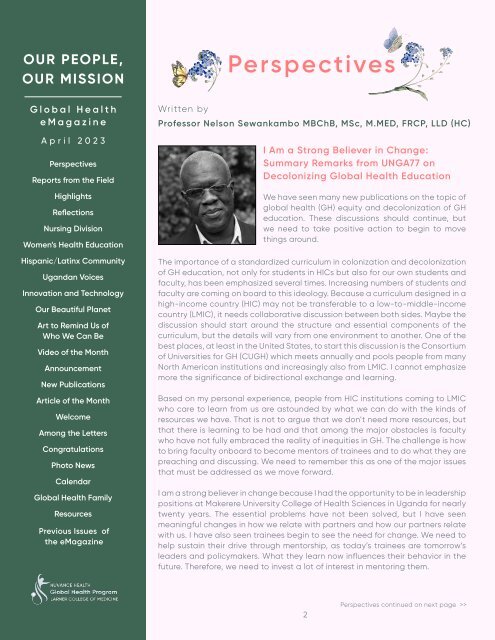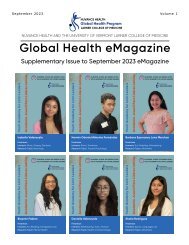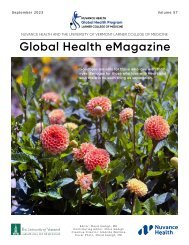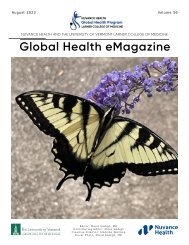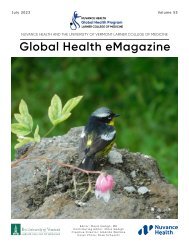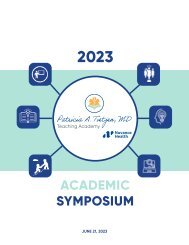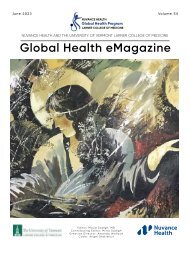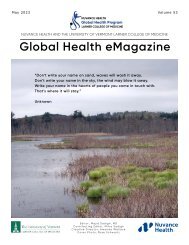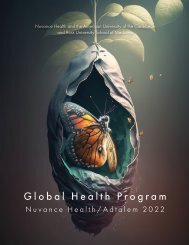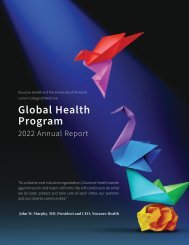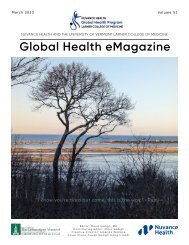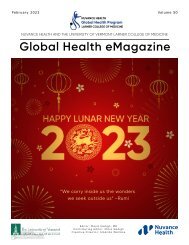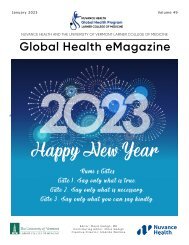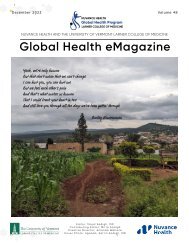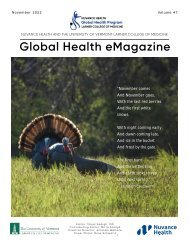eMagazine April 2023
You also want an ePaper? Increase the reach of your titles
YUMPU automatically turns print PDFs into web optimized ePapers that Google loves.
OUR PEOPLE,<br />
OUR MISSION<br />
Perspectives<br />
Global Health<br />
<strong>eMagazine</strong><br />
<strong>April</strong> <strong>2023</strong><br />
Perspectives<br />
Reports from the Field<br />
Highlights<br />
Reflections<br />
Nursing Division<br />
Women’s Health Education<br />
Hispanic/Latinx Community<br />
Ugandan Voices<br />
Innovation and Technology<br />
Our Beautiful Planet<br />
Art to Remind Us of<br />
Who We Can Be<br />
Video of the Month<br />
Announcement<br />
New Publications<br />
Article of the Month<br />
Welcome<br />
Among the Letters<br />
Congratulations<br />
Photo News<br />
Calendar<br />
Global Health Family<br />
Resources<br />
Previous Issues of<br />
the <strong>eMagazine</strong><br />
Written by<br />
Professor Nelson Sewankambo MBChB, MSc, M.MED, FRCP, LLD (HC)<br />
I Am a Strong Believer in Change:<br />
Summary Remarks from UNGA77 on<br />
Decolonizing Global Health Education<br />
We have seen many new publications on the topic of<br />
global health (GH) equity and decolonization of GH<br />
education. These discussions should continue, but<br />
we need to take positive action to begin to move<br />
things around.<br />
The importance of a standardized curriculum in colonization and decolonization<br />
of GH education, not only for students in HICs but also for our own students and<br />
faculty, has been emphasized several times. Increasing numbers of students and<br />
faculty are coming on board to this ideology. Because a curriculum designed in a<br />
high-income country (HIC) may not be transferable to a low-to-middle-income<br />
country (LMIC), it needs collaborative discussion between both sides. Maybe the<br />
discussion should start around the structure and essential components of the<br />
curriculum, but the details will vary from one environment to another. One of the<br />
best places, at least in the United States, to start this discussion is the Consortium<br />
of Universities for GH (CUGH) which meets annually and pools people from many<br />
North American institutions and increasingly also from LMIC. I cannot emphasize<br />
more the significance of bidirectional exchange and learning.<br />
Based on my personal experience, people from HIC institutions coming to LMIC<br />
who care to learn from us are astounded by what we can do with the kinds of<br />
resources we have. That is not to argue that we don’t need more resources, but<br />
that there is learning to be had and that among the major obstacles is faculty<br />
who have not fully embraced the reality of inequities in GH. The challenge is how<br />
to bring faculty onboard to become mentors of trainees and to do what they are<br />
preaching and discussing. We need to remember this as one of the major issues<br />
that must be addressed as we move forward.<br />
I am a strong believer in change because I had the opportunity to be in leadership<br />
positions at Makerere University College of Health Sciences in Uganda for nearly<br />
twenty years. The essential problems have not been solved, but I have seen<br />
meaningful changes in how we relate with partners and how our partners relate<br />
with us. I have also seen trainees begin to see the need for change. We need to<br />
help sustain their drive through mentorship, as today’s trainees are tomorrow’s<br />
leaders and policymakers. What they learn now influences their behavior in the<br />
future. Therefore, we need to invest a lot of interest in mentoring them.<br />
2<br />
Perspectives continued on next page >>


